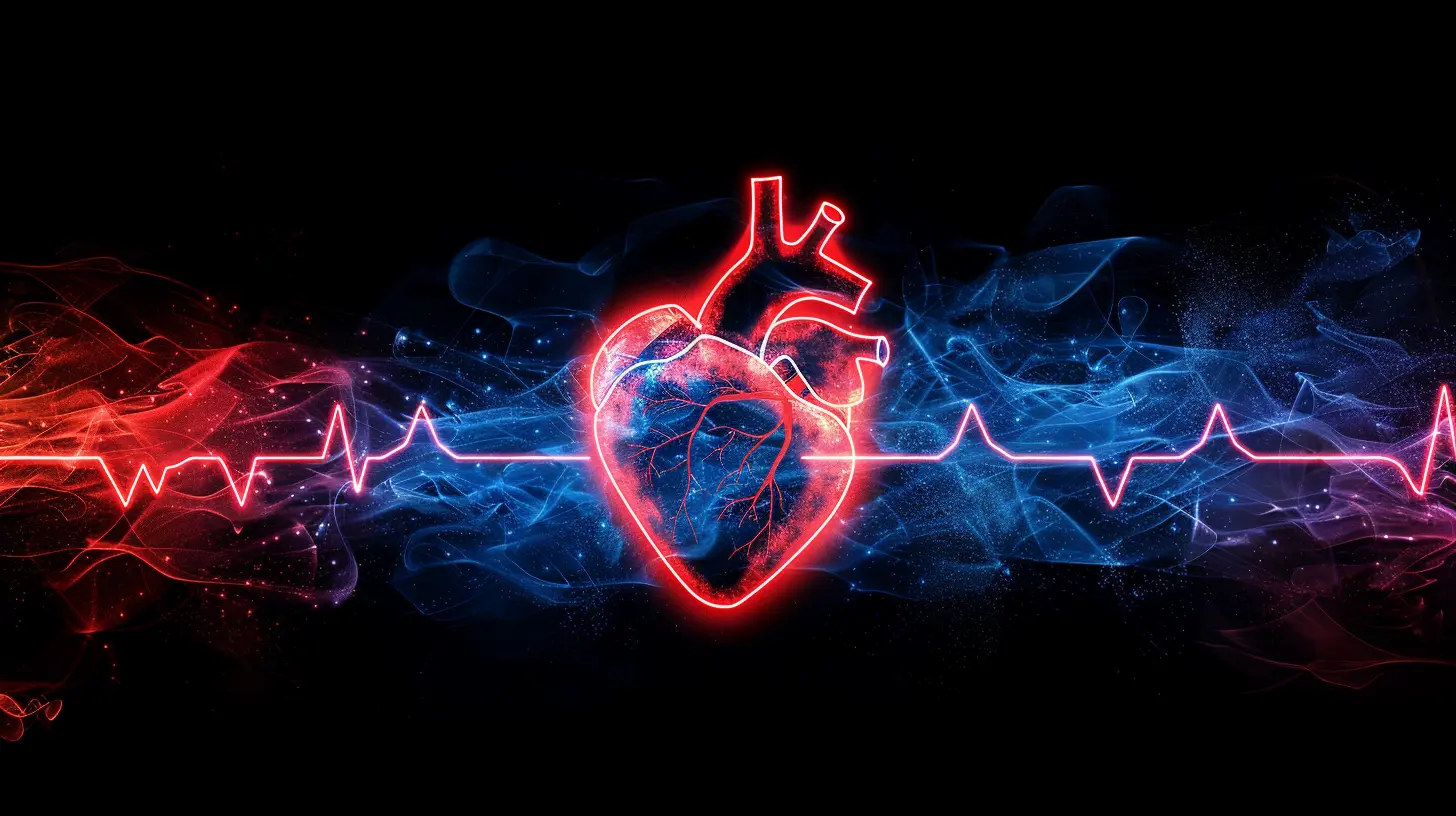Why You Should Monitor Your Heart Rate and What It Tells You
3 January 2025
When was the last time you checked your heart rate? If your answer is, “I’m not sure,” or, “Do I even need to do that?”—then this article is for you. Monitoring your heart rate might sound like something only athletes or fitness junkies do, but here’s the truth: your heart rate is like the narrator of your body’s story. It tells you what’s going on inside, whether things are calm, intense, or needing attention.
In this article, we’ll dive into why keeping tabs on your heart rate is important, what it says about your health, and how you can get started (even if the idea of heart rate monitors feels overwhelming). Let’s get to the heart of the matter… pun intended. 
What Exactly Is Your Heart Rate?
Before we go any further, let’s define “heart rate.” Your heart rate is the number of times your heart beats in a minute, also known as BPM (beats per minute). It’s your body’s internal metronome, keeping everything in sync.But it’s not just a number—it’s a window into your overall health. When you’re resting, your heart rate typically sits lower, like your car idling at a stoplight. When you’re exercising or stressed, it revs up, providing your body with the oxygen and nutrients it needs.
Essentially, your heart rate changes based on what your body is doing and what it needs—a real-time reflection of your physical and emotional state. 
Why Should You Care About Monitoring Your Heart Rate?
Okay, so why does this matter? Can’t we just leave our heart to do its thing, uninterrupted? Sure, you could, but here’s why you shouldn’t.1. It’s a Vital Indicator of Overall Health
Think of your heart rate as a dashboard warning light. A too-high or too-low heart rate could hint at underlying health problems. For example, a consistently rapid heart rate (even when you’re at rest) might signal stress, dehydration, anemia, or even heart disease.On the flip side, a heart rate that’s lower than normal could indicate issues like an underactive thyroid or, in some cases, be a sign of fitness (if you’re an athlete). Either way, knowing these numbers gives you insight into whether your engine is running smoothly or needs servicing.
2. It Can Help Prevent Serious Health Issues
Your heart is your body’s MVP (Most Valuable Player). By paying attention to your heart rate, you can catch potential problems early. For example, irregular rhythms, like atrial fibrillation, increase your risk of stroke. A quick check-in with your heart rate can guide you to seek medical advice before conditions escalate.Think of it like catching a small leak in a boat before the whole thing floods. Monitoring gives you the power to be proactive, not reactive. 
What Can Your Heart Rate Tell You?
Now that we know why it’s important, let’s talk about what your heart rate can actually reveal. It’s not just a random number—it’s packed with clues about how your body is functioning.1. Resting Heart Rate (RHR): Your Baseline Health
Your resting heart rate (the number of beats per minute when you’re calm and relaxed) is a critical health indicator. A normal RHR for most adults is between 60–100 BPM. But did you know that lower is often better?Athletes, for instance, might have a resting heart rate as low as 40 BPM because their hearts are more efficient. If your RHR is consistently high—say north of 80—this could be a subtle red flag for stress, a sedentary lifestyle, or even lurking heart conditions.
2. Heart Rate Variability (HRV): Your Stress Adapter
Heart Rate Variability refers to the small fluctuations in time between heartbeats. Higher variability is a good thing—it means your body is resilient and adapting well to stress. Low HRV, on the other hand? It could indicate you’re overworked, stressed out, or not recovering well. Think of HRV as your body's “stress thermometer.”3. Target Heart Rate During Exercise
Want to make the most of your workout? Your heart rate can tell you if you’re working hard enough—or maybe pushing a little too far.Each person has a “target heart rate” zone based on their age and fitness level. For instance, to improve cardiovascular fitness, you should aim for 50–85% of your maximum heart rate (which you can estimate with the formula 220 minus your age).
So if you’re 30 years old, your max heart rate would be about 190 BPM, and your target zone would be between 95–162 BPM. Staying in the zone means you're doing enough to boost fitness but not so much you risk injury. 
How to Monitor Your Heart Rate
Don’t worry—you don’t need fancy equipment or a degree in medicine to keep an eye on your heart rate. Here are simple ways to do it:1. Use Your Fingers and a Watch
This is the old-school, no-tech method. Just place your index and middle fingers on your wrist (or neck) and count the number of beats in 15 seconds. Multiply by four, and voilà—you’ve got your BPM.Simple, right? This is perfect for checking your resting heart rate, especially first thing in the morning when your body is calm.
2. Fitness Trackers and Smartwatches
From Fitbits to Apple Watches, wearable tech has made heart rate monitoring easier than ever. These devices track your heart rate 24/7, and some even give you insights into your HRV, target zones, and more.3. Heart Rate Monitors for Exercise
For fitness enthusiasts, strap-based monitors are considered the gold standard. They’re more accurate for tracking heart rate during intense activities, helping you stay in that all-important target zone.When Should You Be Concerned About Your Heart Rate?
Let’s get real for a second. Just because your heart rate changes doesn’t mean you need to panic. Your heart naturally responds to different situations—running up the stairs? It’ll speed up. Meditating? It’ll slow down.But there are times when an unusual heart rate might warrant a closer look:
- Resting Heart Rate Above 100 BPM: This could be a sign of stress, a fever, or even dehydration. If it’s consistently high, it’s worth consulting a healthcare provider.
- Resting Heart Rate Below 60 BPM (and you’re not an athlete): Could be a sign of bradycardia, or a slow heart rate.
- Irregular Heart Rhythm: If your heart feels like it’s skipping beats or fluttering, this could point to conditions like atrial fibrillation.
- Sudden Spikes During Rest: If your heart rate jumps up out of nowhere and stays high, even when you’re not moving or stressed, seek medical advice.
Tips for a Healthy Heart Rate
Your heart rate reflects your lifestyle, so improving it often means making healthier choices. Here’s how you can keep your ticker in tip-top shape:- Stay Active: Regular exercise (even brisk walking) strengthens your heart and lowers your resting heart rate over time.
- Eat Heart-Healthy Foods: Think fruits, veggies, whole grains, lean protein, and healthy fats.
- Reduce Stress: Practice mindfulness, breathe deeply, or take up yoga to keep your heart calm and steady.
- Get Quality Sleep: Poor sleep can mess with your heart rate big time. Aim for 7–9 hours a night.
- Stay Hydrated: Your heart works harder when you’re dehydrated, so make water your best friend.
The Bottom Line
Your heart rate is more than just a number—it’s a vital sign of your overall health and well-being. Monitoring it regularly can help you understand your body better, improve your fitness, and catch any potential issues before they become serious.And let’s be honest: it doesn’t take much effort to check your heart rate every now and then. Whether you’re using your fingers, a smartwatch, or a fitness tracker, those few seconds could provide invaluable insights into your health.
So next time you feel your pulse, remember—it’s not just a beat. It’s the rhythm of your life, keeping you moving, loving, and living.
all images in this post were generated using AI tools
Category:
Heart HealthAuthor:

Arthur McKeever
Discussion
rate this article
10 comments
Stella McKenzie
Your heart rate isn’t just numbers—it’s a lifeline. Ignoring it is reckless. Monitor it regularly, understand your body, and take charge of your health unapologetically!
February 25, 2025 at 3:46 PM

Arthur McKeever
Absolutely! Monitoring your heart rate is essential for understanding your health and making informed decisions. Your body communicates through these numbers—listen to it!
Maxine McIntosh
Great read! Monitoring your heart rate can feel a bit technical, but it’s such a simple way to stay in tune with your body. Plus, it offers valuable insights into your fitness and overall health. Here’s to our heart health! ❤️
February 1, 2025 at 5:27 PM

Arthur McKeever
Thank you! I'm glad you found it helpful. Here's to staying healthy together! ❤️
Nicole Spencer
Monitoring your heart rate is a fun way to boost health and stay heart-smart! ❤️✨
January 20, 2025 at 3:29 PM

Arthur McKeever
Absolutely! Monitoring your heart rate not only encourages healthy habits but also provides valuable insights into your overall wellness. ❤️✨
Aleta Long
Monitoring your heart rate is a key to understanding your body’s response to exercise and stress. It empowers you to optimize health, enhance fitness, and catch potential issues early.
January 14, 2025 at 4:02 AM

Arthur McKeever
Absolutely! Monitoring heart rate is essential for optimizing health and fitness while identifying potential issues early on. It truly empowers individuals to take control of their well-being.
Kathleen McMaster
Keeping an eye on your heart rate can be a fun way to connect with your body! It's like having a little coach cheering you on. So, let’s embrace those beats and discover what they reveal about our health. Your heart will thank you! ❤️
January 8, 2025 at 3:42 PM

Arthur McKeever
Absolutely! Monitoring heart rate is a great way to foster connection with our bodies and gain insights into our health. Thank you for sharing this enthusiasm! ❤️
Marley O'Brien
Great article! Monitoring your heart rate is so important for keeping track of your overall health. It’s amazing how much our heart can tell us about our fitness levels and stress. Thanks for shedding light on this vital topic!
January 8, 2025 at 4:08 AM

Arthur McKeever
Thank you for your kind words! I'm glad you found the article helpful in highlighting the importance of heart rate monitoring for overall health.
Kaitlyn McDermott
Monitoring your heart rate is essential for understanding your cardiovascular health and optimizing your fitness routine. It can provide valuable insights into your body's response to exercise, stress, and overall well-being, helping you make informed decisions for a healthier lifestyle.
January 7, 2025 at 5:44 AM

Arthur McKeever
Thank you for highlighting the importance of heart rate monitoring! It truly is a key tool for optimizing fitness and understanding our body’s responses.
Rhiannon Kelly
Heart health matters—keep smiling and tracking!
January 6, 2025 at 4:58 AM

Arthur McKeever
Absolutely! A positive outlook and regular tracking are key to maintaining heart health. Thank you for your support!
Meagan Lawson
Monitoring your heart rate isn’t just for athletes; it’s your body’s way of communicating! From stress levels to workout effectiveness, understanding your pulse can unlock insights into your health. Think of it as your personal rhythm section—keeping you in tune with your well-being. Don’t skip a beat!
January 4, 2025 at 3:29 AM

Arthur McKeever
Absolutely! Monitoring your heart rate is essential for everyone, as it provides valuable insights into your overall health and well-being. Staying in tune with your pulse can help you manage stress and optimize your fitness. Don't overlook its importance!
Quinn Franklin
Empower your health journey! Monitoring your heart rate unveils insights into your fitness, stress levels, and overall well-being. Take control—your heart's rhythm is your guide!
January 3, 2025 at 4:07 PM

Arthur McKeever
Thank you for your insightful comment! Monitoring heart rate truly empowers individuals to understand and enhance their health journey effectively.
MORE POSTS

How to Correctly Adjust Your Bike for Comfort and Efficiency

The Link Between Vitamin Deficiency and Chronic Fatigue

Understanding the Role of Fat-Soluble Vitamins in Nutrition

The Role of Probiotics in Pediatric Gut Health

How to Overcome Keto Plateaus and Stay on Track

Why and How You Should Take Power Naps for Energy

Are Low Carb Diets Safe for People With Diabetes?